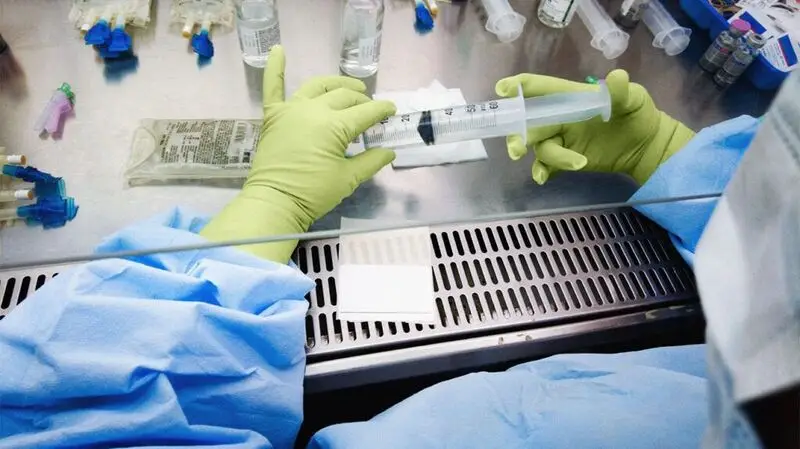
- While there are several treatment options for colon cancer, not all of them work for all cancer types.
- Deficient mismatch repair (dMMR) colon cancer is known to be less responsive to chemotherapy than other types.
- A new study reports that adding immunotherapy to chemotherapy after surgery for stage 3 colon cancer may help decrease a person’s recurrence and death rate by half.
As of 2020, more than
Also known as colon cancer, this type of cancer is currently treated in a number of ways, including surgery, radiation therapy, immunotherapy, and chemotherapy.
However, not all treatments work for all types of colorectal cancer. For example,
Now, a new study presented at the 2025 American Society of Clinical Oncology (ASCO) Annual Meeting reports that adding immunotherapy to chemotherapy after surgery for stage 3 colon cancer may help decrease a person’s recurrence and death rate by half.
The findings are yet to be published in a peer-reviewed journal.
For this phase III clinical trial, researchers recruited 712 people with an average age of 64 who had dMMR stage 3 colon cancer. This stage of colorectal cancer occurs when the cancer spreads to the body’s lymph nodes, but nowhere else.
All study participants had undergone surgery to have their cancer removed and still had cancer cells in their lymph nodes.
Participants were randomly assigned to either receive just
Atezolizumab targets a specific protein in cancer cells called
At the study’s conclusion, researchers found that participants receiving chemotherapy with immunotherapy had a 50% decrease in cancer recurrence and death — known as disease-free survival (DFS) — compared to those who only received chemotherapy.
“The findings from our study represent a major advance in the adjuvant treatment of dMMR stage 3 colon cancer and will now change the treatment for this type of cancer,” says Frank Sinicrope, MD, oncologist at the Mayo Clinic in Minnesota and lead author of this study, in a press release.
“It’s extremely rewarding to be able to offer our patients a new treatment regimen that can reduce the risk of recurrence and improve their chances of survival,” he says.
Medical News Today spoke with Glenn S. Parker, MD, FACS, FASCRS, vice chairman of surgery and chief of colorectal surgery at Hackensack Meridian Jersey Shore University Medical Center in New Jersey, about this study who commented that his first reaction to these findings was a strong sense of hope.
“The use of atezolizumab, an immune checkpoint inhibitor, alongside standard chemotherapy in stage III dMMR colon cancer represents a significant step forward in the care of our patients,” Parker explained. “Patients with dMMR colon cancer often have a distinct tumor biology that affects how they respond to chemotherapy. Although they generally have a better prognosis, recurrence still occurs, and current treatments may not be optimal for this group.”
“Developing therapies that work with the immune system, like atezolizumab, could specifically target the molecular genetics of dMMR tumors and significantly reduce the chance of cancer returning, leading to better long-term outcomes.”
— Glenn S. Parker, MD, FACS, FASCRS
Parker said he would like to see extended follow-up from the clinical trial to evaluate long-term survival and recurrence data.
“Additionally, further studies should explore whether immunotherapy could eventually reduce the length of time for both adjuvant chemotherapy/immunotherapy in some dMMR patients, particularly those with high immune activation profiles,” he continued.
“Biomarker analyses and quality-of-life assessments will also be critical in determining which patients benefit the most from combined therapy and how best to integrate this approach into standard of care,” he added.
MNT also spoke with Wael Harb, MD, a board certified hematologist and medical oncologist at MemorialCare Cancer Institute at Orange Coast and Saddleback Medical Centers in Orange County, CA, about this research, who said he was genuinely excited by the trial’s results.
“Colon cancer is one of the most common and deadly cancers worldwide,” he continued. “Even after surgery, many patients — especially those with stage III disease — face a real risk that their cancer will return. For people with dMMR tumors, traditional chemotherapy doesn’t always offer enough protection. What makes this group unique is that their tumors are especially responsive to immunotherapy. So finding new ways — like this study — to harness the immune system gives us a much better shot at keeping the cancer from coming back,” Harb explained.
“This study is a major step forward for patients with stage III colon cancer who have a specific genetic feature called dMMR. The combination of standard chemotherapy with the immunotherapy drug atezolizumab cut the risk of cancer recurrence and death by 50%. That’s a dramatic improvement — and in the world of cancer care, results like these can lead to real changes in how we treat patients. It’s the kind of data that could redefine the standard of care.”
— Wael Harb, MD
Harb said the most important next step for this research is to see this approach integrated into treatment guidelines, so doctors everywhere can offer it to eligible patients.
“I’d also like to see longer-term follow-up data to confirm the durability of benefit and monitor safety over time. And looking ahead, it would be exciting to explore whether immunotherapy could also help patients with earlier-stage disease — or even be used instead of chemotherapy in some cases. Ultimately, this study opens the door to more personalized and effective treatments for colon cancer,” he added.





